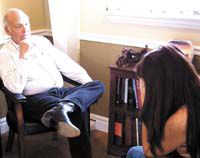| Karl Kraync LPC, counsels a local residents about the stresses associated with post traumatic stress disorder. PTSD affects 5.2 million Americans annually. |
Post traumatic stress affects thousands of Americans every year and, with the recent tragedies at Crandall Canyon, local counselors are ready to provide treatment for the debilitating disorder.
About 3.6 percent of adult Americans or 5.2 million people suffer the effects of PTSD during the course of a given year and while the disorder is more prevalent among women it can affect everyone including children, according to the Cleveland Clinic, a facility that specializes in PTSD.
“When I worked with people from previous mine disasters, going back into the mine was something that could be very difficult for them,” said Karl Kraync a licensed professional and certified rehabilitation counselor from Price. “In some cases, they would react to even the slightest changes in the mine with an overpowering urge to flee the situation and re-live the previous trauma.”
Information gathered from the Diagnostic and Statistical Manual of Mental Disorders and web MD reports that symptoms of PTSD often start within three months of the event.
In some cases, however, the symptoms of traumatic stress disorder do not begin until years later.
The severity and duration of the illness vary.
Some people recover within six months, while for others the situation can last much longer.
“Stress from a traumatic situation is normal,” commented Kraync. “However, when the stress becomes acute or chronic, it may be time to seek out a counselor. There is no reason to wait until your life becomes dysfunctional to get help.”
“Some individuals show an excessive amount of hyper-vigilance and are on edge a good deal of the time. This type of behavior can be completely disruptive to a person’s life,” continued the local counselor.
According to the web MD site, symptoms of PTSD often are grouped into three main categories. The categories include:
•Reliving – People with the disorder repeatedly relive the ordeal through thoughts and memories of the trauma.
Examples may include flashbacks, hallucinations and nightmares.
People with the disorder also may feel great distress when certain things remind them of the trauma, such as the anniversary date of the event.
•Avoiding – The individual may avoid people, places, thoughts or situations that may remind him or her of the trauma.
Avoiding can lead to feelings of detachment and isolation from family and friends, as well as a loss of interest in activities that the person once enjoyed.
•Increased arousal. The symptoms include excessive emotions; problems relating to others, including feeling or showing affection; difficulty falling or staying asleep; irritability; outbursts of anger; difficulty concentrating; and being jumpy or easily startled.
The person may also suffer physical symptoms, such as increased blood pressure and heart rate, rapid breathing, muscle tension, nausea and diarrhea.
“In situations like what happened on 9/11 and at Virginia Tech counselors were immediately put into action to help individuals deal with the trauma mentally and emotionally,” explained Kraync. “In my opinion it is important that we let people in Carbon and Emery County know that there is help available to them and that it is important that they get it.”
Kraync reports that a combined treatment approach including medication and counseling has worked well for his PTSD patients in the past. Kranyc could not stress enough the seriousness of the disorder and the importance or early intervention.
“I have seen PTSD cause individuals to go on full disability. I have seen it cause patients of mine to regress from society and I have seen it push individuals toward very dysfunctional lifestyles,” commented the licensed counselor.
According to data, everyone reacts to traumatic events differently. Each person is unique in his or her ability to manage fear and stress and to cope with the threat posed by a traumatic event or situation. For that reason, not everyone who experiences or witnesses a trauma will develop PTSD. Further, the type of help and support a person receives from friends, family members and professionals following the trauma may influence the development of PTSD or the severity of the symptoms.
Kraync reports that individuals suffering from PTSD exhibit a higher than normal disposition for self medication that can lead to substance abuse. He further stipulated that many times individuals avoid seeking counseling because of issues with their own pride or fear of embarrassment among their peers.
“If your leg was broken, you would see a doctor,” stated Kraync. “This is no different. If you are having problems with PTSD or any other disorder, you should seek treatment.”
Assistance for those suffering from these disorders is available in Castle Valley from any number of private counselors or at Four Corners Behavioral Health.
“The good news with this disorder is that most individuals respond very well to treatment,” concluded Kraync. “Most who seek treatment have a very positive success rate.”

